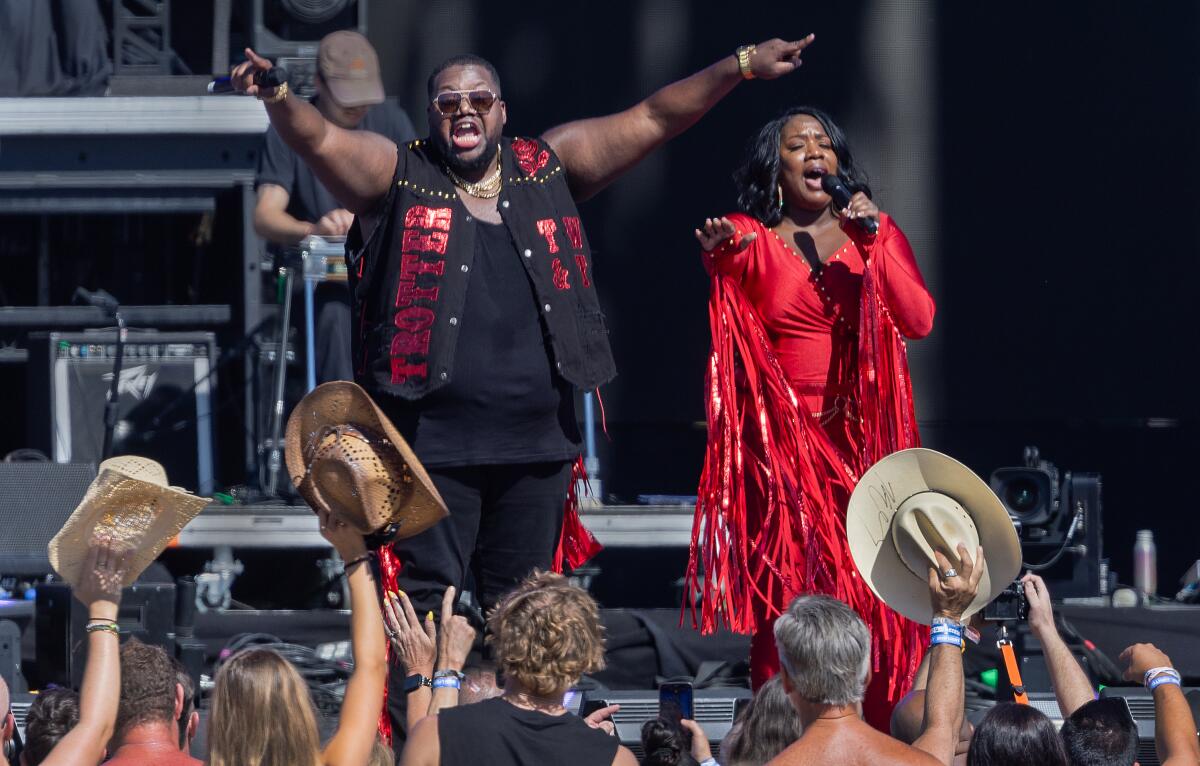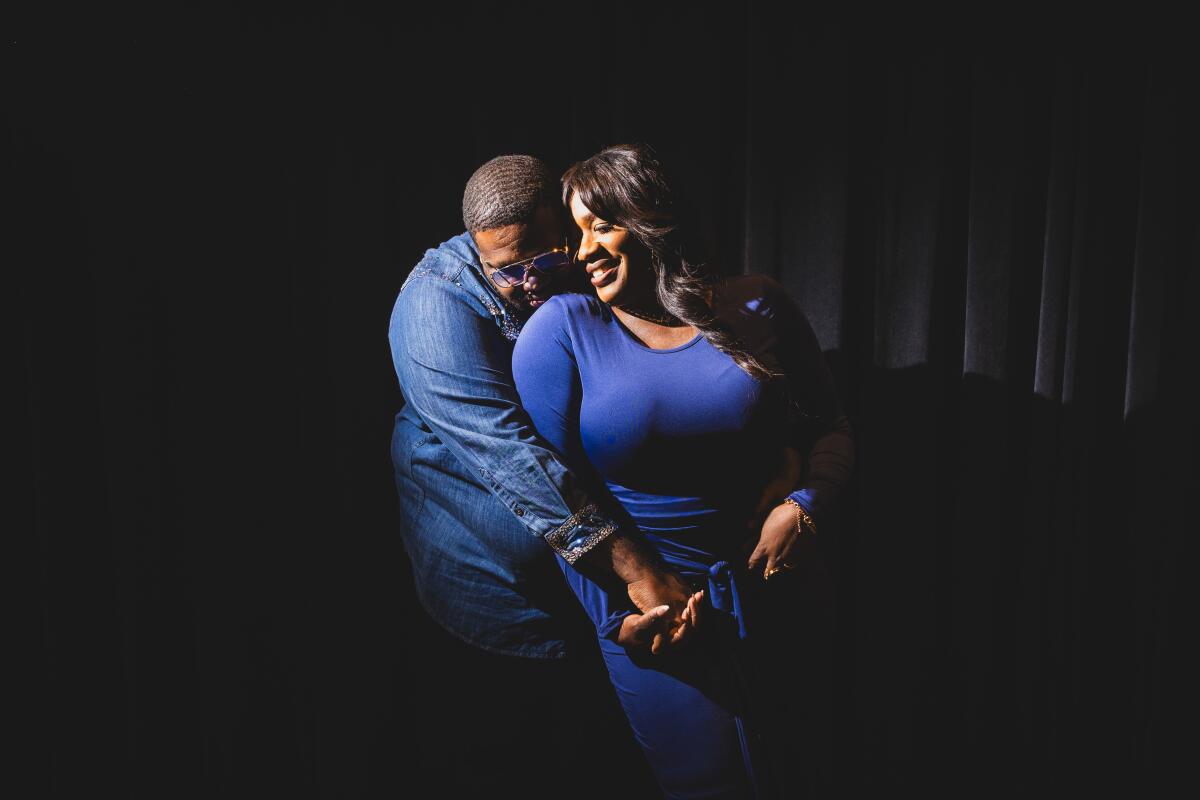INDIO, Calif. — About an hour after the War and Treaty burned down April’s Stagecoach festival with a scorching rendition of “The Star-Spangled Banner,” the married country duo’s Michael Trotter Jr. and Tanya Trotter are cooling down in an air-conditioned trailer as they ponder a question: Who sang the greatest national anthem of all time?
“To me, it has to be Whitney Houston,” Tanya says, to which Michael nods in agreement. “There’s a Mt. Rushmore, though,” he adds. “No. 2, Chris Stapleton. No. 3 — this is debatable — I think Jennifer Hudson.” He runs a comb through his hair as he considers a fourth. “Kelly Clarkson does a really good job. Beyoncé does a great job.”
No room for Marvin Gaye, who performed a famously sultry interpretation at 1983’s NBA All-Star Game? Michael crinkles up his face.
“Oh, that’s the worst version,” he says.
“We should not go on the record saying that,” Tanya advises.
Michael: “I’m not afraid. I’ll go on the record.”
Tanya: “Here we go.”
Michael: “Listen, I don’t want to f— to the national anthem.”
Tanya: “Oh, lord.”
“I want to think of the service and of war and how me and my battle buddies fought for freedom,” says Michael, who began writing songs as an Army soldier stationed in Baghdad during the Iraq war. “So, Marvin Gaye — I just don’t like it.” He grins. “But that’s OK. If Tanya wants to do it to his version, hell, yeah — let’s do it. Now, it’s the best version ever.”
Two decades after Michael’s experience in Iraq, the War and Treaty has carved out a space as one of the most exciting live acts in American roots music, with a catalog of wise and passionate songs about loyalty, faith and romance and a boisterous stage show that evokes memories of Ike and Tina Turner. In February, the Nashville-based couple — Michael is 42, Tanya, 50 — were nominated for best new artist at the 66th Grammy Awards (despite having released their fourth studio album, “Lover’s Game,” in 2023).
Zach Bryan recruited the Trotters to appear on his smash self-titled LP from last year, then asked the duo to open for him this month at Crypto.com Arena. And on July 10, they’ll return to Southern California to play SoFi Stadium with no less an institution than the Rolling Stones.
“It’s absolute magic, the two of their voices together,” says country star Nate Smith, whose new EP, “Through the Smoke,” features a harmony-drenched collaboration with the War and Treaty. Smith remembers seeing the duo perform “That’s How Love Is Made” at November’s Country Music Assn. Awards and being brought to tears by the intensity of the emotion in their singing. “We’re talking beyond goosebumps,” he adds. “I was literally bawling — like, ‘What is wrong with me right now?’”
Indeed, the Trotters have become reliable showstoppers at Nashville’s many televised awards events, including the Academy of Country Music Honors (where they paid tribute to Stapleton last year with a sexy-churchy take on his song “Cold”) and CMT’s recent “Smashing Glass” special (where they got Patti LaBelle fanning herself as they belted LaBelle and Michael McDonald’s classic “On My Own”).
The format is an ideal showcase for the War and Treaty’s sweaty blend of country, rock, gospel and R&B: To see the Trotters lock eyes and voices is to believe them. But according to the couple, it’s also the only available remedy to a vexing problem.
“People talk all the time: ‘They’re just awards-show babies,’” Michael says. “Yep, you’re right — we are. Because the reality of the situation is that we’re not getting played on country radio. So we’ve got to treat TV like you would radio and try to get on every awards show we can. And when we get on there, we’re gonna try and do the same thing every single time, which is to blow the roof off until people understand that we’re here to stay.”

The War And Treaty perform at April’s Stagecoach festival.
(Allen J. Schaben/Los Angeles Times)
Even in an era defined by streaming, country radio retains much of the genre’s hitmaking power. And though the War and Treaty are part of a growing number of Black voices in Nashville — think also of Kane Brown and Mickey Guyton and Brittney Spencer — playlists remain thoroughly dominated by white men, including those visiting from other styles: Compare the immediate No. 1 showing by Post Malone’s “I Had Some Help” on Billboard’s Country Airplay chart to Beyoncé’s peak at No. 33 with “Texas Hold ’Em,” from the much-discussed “Cowboy Carter” album that she’s said was inspired by the country industry’s cold shoulder. (One of Beyoncé’s collaborators, Shaboozey, may have an exception on his hands with “A Bar Song (Tipsy),” which is steadily rising at country radio.)
Asked if they feel welcome at a festival like Stagecoach — other acts on this year’s bill included Morgan Wallen, Hardy, Jelly Roll and Miranda Lambert — Tanya says, “Definitely,” while Michael reflects for a moment. “I don’t think it’s enough to feel welcome,” he says. “There’s something else to feel, which is to feel together. And when you have artists standing onstage yelling about redneck culture, you know they’re not talking to you. So I think what we have to do as a culture is we have to stop laying out the welcome mat and really start extending the hand. There’s a difference.”
As a committed purveyor of songs about love — not about the pain of its absence but about its promise of spiritual fulfillment — Michael acknowledges that the War and Treaty is out of step with most modern country music, which he says is “based on heartbreak and s—talking.” He laughs. “It’s the truth: Morgan’s main song is ‘Last Night’” — Wallen’s chart-topper about a couple’s drunken breakup — “and then Hardy’s out here singing about ‘I woke up on the wrong side of the truck bed.’ I look at that and I’m like, ‘Is this where War and Treaty fits? Is this where we show that there’s still a market for art that focuses on love?’”
As he and Tanya chat in their trailer, they’re preparing their outfits for a second performance on one of Stagecoach’s smaller side stages. On the main stage earlier, Tanya wore a red-fringed bodysuit she describes as an homage to one of her “fashion gods,” Diana Ross; Michael wore matching red-and-black pants and a vest that he says nodded to a couple of heroes of his own, pro wrestlers “Macho Man” Randy Savage and “Stone Cold” Steve Austin.
Is Michael a big wrestling guy?
“He’s a fanatic,” Tanya says.
“All the way,” Michael confirms. Then he warns me against delving into the topic if there’s anything else I’d like to leave time to discuss with him and his wife. “Trust me, we need to move on now,” he says, smiling.
Adds Tanya: “Please, let’s not open this box.”
The Trotters, who’ve been married since 2011 and have a 13-year-old son, sing and write with the familiarity of longtime partners.
In “The Best That I Have,” a simmering slow jam from “Lover’s Game,” Tanya joins a lover on the couch with ice cream and reruns of “The Golden Girls.” And onstage, the two communicate with an unspoken intimacy, signaling each other to take a vocal line or to hold back with just a look or a touch on the wrist.
“Me and Tanya, we share time and space in every way,” Michael says.

Michael Trotter Jr. and Tanya Trotter have been married since 2011 and share a 13-year-old son.
(Jason Armond/Los Angeles Times)
The two formed the War and Treaty in 2014 after each had learned to play on their own. “Freaked out,” as he puts it, by the brutal reality of the war in Iraq, Michael would soothe himself by playing a piano his fellow soldiers had found in the basement of one of Saddam Hussein’s palaces; eventually, he started writing songs to memorialize fallen members of his unit. “And that brought so much healing and resolution to the troops that they decided that would be my new role,” he says.
At one point on Stagecoach’s main stage, Michael asked how many veterans were in the crowd; not many folks made their presence known — fewer, certainly, than would have, say, two decades ago. Does he think about that?
“I do, and I know why,” he says after the performance. “In the past 20-something years, we’ve gone through a strong love-hate relationship with the military. Our leaders have done a poor job in protecting service members, because now Americans look at service members as based on who’s president at the time. We forget that men and women are raising their hand to fight for freedom — losing their lives and their limbs and their sanity. There’s no emphasis on their service. Artists don’t give a s— anymore.
“Toby Keith was dripping in the red, white and blue,” he says of the late country star known for his patriotic songs and his USO tours, “and he was very sad to leave that legacy to no one. So me and Tanya, we kind of fill that void.”

Tanya got an early boost as a singer when she appeared in the 1993 movie “Sister Act 2: Back in the Habit,” which featured a scene in which she and Lauryn Hill sang “His Eye Is on the Sparrow.” She went on to release an R&B album the next year and later signed with Sean “Diddy” Combs’ Bad Boy label, though a planned LP never materialized. (Asked about the sexual abuse several women have accused Combs of in recent months, Tanya says, “I don’t have any comment, only because I have a gag order. I can’t talk about it legally.”)
How does singing country music differ from singing R&B? “You know, I never realized that there was a difference,” Tanya says. “When I would see Patti LaBelle and Dolly Parton together on television, they were both flamboyant, they both had red nails. It wasn’t until I got into the business of music that they’re like, ‘This is this, and this is that.’”
The Trotters have continued to blur those genre lines in a series of singles they’ve released this year, including the lush “Stealing a Kiss,” which calls to mind the psychedelic soul music of the 1970s, and the bluegrass-steeped “Leads Me Home.” “Called You By Your Name,” meanwhile, is a blistering gospel-rock rave-up with blaring New Orleans-style brass.
The couple have tentative plans to release an album early next year, though they’re booked solid on the road for the rest of 2024, including festival dates and opening gigs for the likes of Bryan, Lyle Lovett and Gary Clark Jr. (with whom they’ll appear Aug. 21 at the Hollywood Bowl).
Michael says he views the job as a support act “with honor and reverence,” but he also admits, “I feel drained from it sometimes. I’d be lying if I didn’t say I’m wondering when will it be our turn?”
He knows that Nashville rewards the kind of sustained hard work put in by Jelly Roll and Lainey Wilson, both of whom said yes to seemingly every invitation before finally leveling up over the last couple of years. But he also knows how many mediocre songs about trucks and beer are filling the country airwaves instead of tunes by the War and Treaty. To keep motivated, he reminds himself of what music once did for him as a veteran experiencing post-traumatic stress disorder.
“You have your moments where you’re f—ing tired and you don’t feel like trying to get a crowd to wave their little hands,” he says. “But Tanya and I, we’ve got a song that somebody might need to hear that will cause them to want to live another day. Because our whole heart is in it, we have no choice. That’s what keeps me going.”


